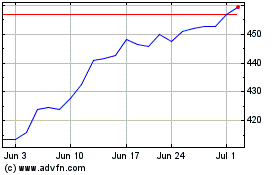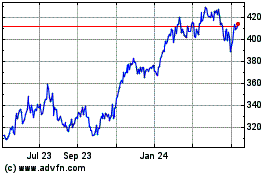Microsoft Sets 2017 High With $17 Billion Bond Sale -- Update
January 30 2017 - 5:47PM
Dow Jones News
By Sam Goldfarb
Microsoft Corp. was set to sell $17 billion of bonds Monday,
capping a busy month for corporate bond issuance with the largest
deal of the young year.
Surprising investors with such a big deal so soon after it sold
$19.75 billion of bonds last August, Microsoft nonetheless met with
a warm reception from the market, allowing it to increase the size
of the offering from an initial estimate of $14 billion.
Proceeds from the seven-part deal, which includes a 10-year bond
sold with an interest rate 0.85 percentage point above Treasurys,
are expected to be used for general corporate purposes, including
the retirement of short-term debt used to help fund Microsoft's $26
billion acquisition of LinkedIn Corp.
Investment-grade companies have sold $146 billion of bonds this
year, the most for any comparable period on record going back to
1995, according to Dealogic. Many firms are wary of rising interest
rates and potential tax changes that could make it costlier to
issue debt, analysts said.
Microsoft issued its first bonds in 2009 and has kept issuing
bonds even as it pursued an ambitious share-repurchase program. In
September, the company announced plans to boost its dividend by 8%
and buy back up to $40 billion in stock as it neared completion of
its previous share repurchase program.
In general, share buybacks funded directly or indirectly by debt
are unpopular among bond investors, who would rather companies use
bonds to refinance existing debt or invest in their business. But
stock investors like the programs, and low interest rates and
steady economic growth so far have limited any effect of
bondholders' distaste for the practice.
Microsoft shares have climbed 18% over the past year, closing
Monday at $65.13.
Microsoft has been enjoying a renaissance of late with the
growth of its cloud-computing business, stirring hopes that its
stock price can keep rising, said Jordan Chalfin, a senior analyst
at the research firm CreditSights.
The company last week posted $5.2 billion in second-quarter net
income, or 66 cents a share, compared with a profit of $5.02
billion, or 62 cents a share, a year ago.
Microsoft's long term debt totaled $59.3 billion at the end of
last year, up from zero in mid-2008, according to S&P Capital
IQ. But it still has a large cash balance and the highest possible
credit ratings from both Moody's Investors Service and S&P
Global Ratings.
"If you think your stock is cheap and you're not going to be
penalized," there is no reason not to issue bonds, Mr. Chalfin
said.
Before the Microsoft offering, the largest corporate bond sale
this year was a $13.55 billion issuance from Broadcom Ltd. on Jan.
11. The largest sale last year came from Anheuser-Busch InBev,
which issued $46 billion of bonds.
One reason why companies have issued debt this month is that
they are concerned that government bond yields could keep rising,
making borrowing more expensive, said Matt Brill, a portfolio
manager at Invesco.
Another involves tax proposals put forward by congressional
Republicans that would eliminate the tax deduction for net interest
payments. Though it is unclear whether such a plan would become law
and in what form, companies are betting that it could happen but
that the interest on existing bonds would be exempted, Mr. Brill
said.
Write to Sam Goldfarb at sam.goldfarb@wsj.com
(END) Dow Jones Newswires
January 30, 2017 17:32 ET (22:32 GMT)
Copyright (c) 2017 Dow Jones & Company, Inc.
Microsoft (NASDAQ:MSFT)
Historical Stock Chart
From Mar 2024 to Apr 2024

Microsoft (NASDAQ:MSFT)
Historical Stock Chart
From Apr 2023 to Apr 2024
